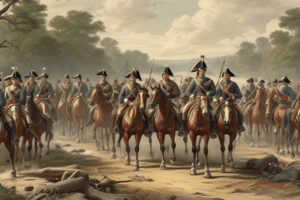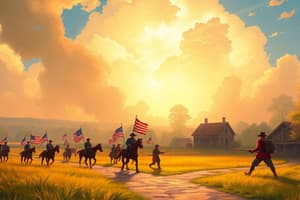Podcast
Questions and Answers
Who ordered British troops to seize weapons and munitions in Concord?
Who ordered British troops to seize weapons and munitions in Concord?
- Governor General Thomas Gage (correct)
- Ralph Waldo Emerson
- Major John Pitcairn
- Colonel Francis Smith
Who warned the colonists of the British approach as express riders?
Who warned the colonists of the British approach as express riders?
- Captain John Parker
- Colonel Francis Smith
- Major John Pitcairn
- Paul Revere and William Dawes (correct)
Where did the Minutemen gather upon receiving word of the British approach?
Where did the Minutemen gather upon receiving word of the British approach?
- Boston
- Buckman's Tavern in Lexington (correct)
- Concord
- The ridge across the river
Flashcards are hidden until you start studying
Study Notes
- American poet Ralph Waldo Emerson described the events that took place in Concord, Massachusetts on April 19, 1775, where the American Revolution began.
- Tensions between the countryside and the city of Boston resulted in Governor General Thomas Gage ordering British troops to seize weapons and munitions in Concord.
- At around 10:00 p.m. on April 18, 1775, British troops led by Colonel Francis Smith and Major John Pitcairn set out from Boston with 800 troops towards Concord.
- Paul Revere and William Dawes, as express riders, warned the colonists of the British approach, allowing them to gather and prepare for battle.
- At around 5:30 a.m., 70 Minutemen under the command of Captain John Parker gathered at Buckman's Tavern in Lexington, where they received word that the British were in sight.
- Parker led his men out of the tavern and lined them up in two rows, intending to show defiance, not to block the road.
- Shots were fired, it is unclear who fired first, and the British retaliated, resulting in casualties on both sides.
- As the British retreated from Concord, they were met with resistance from Patriot units, militia units, and Minuteman groups.
- The British initially held a ridge across the river, but upon seeing the numbers of their opponents, they retreated, tearing up the bridge planks as they went.
- The American forces pursued the British, resulting in a running gunfight that lasted for several hours and marked the beginning of the American Revolution.
Studying That Suits You
Use AI to generate personalized quizzes and flashcards to suit your learning preferences.



